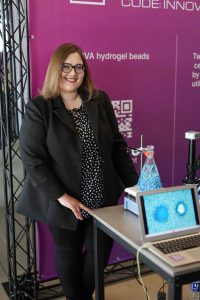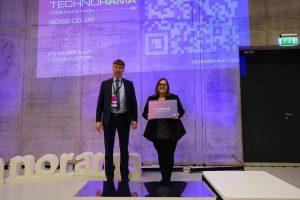A team of researchers from Kaunas University of Technology (KTU), Lithuania, developed an innovative method for cleaning contaminated water. Hydrogel granules made from polyvinyl alcohol (PVA) function as a biological carrier for microorganism cultures, which decompose pollutants in wastewater. According to the researchers, the treatment works up to 5 times faster compared to conventional methods.
In May 2022, the invention was awarded the highest prize in the annual KTU innovation fair Technorama.

The availability of clean water is of utmost importance for everyone. In addition to household effluent and human waste, urban-based hospitals and industries such as small-scale mining and motor garages, often dump highly toxic chemicals and medical waste into the wastewater system. Pollutants released into the environment pose a significant threat not only to human health but to the ecosystem as a whole.
The European Commission report reveals that 95 per cent of wastewater in the EU is collected and 88 per cent is biologically treated. However, over 6 per cent is not sufficiently well treated to meet secondary biological treatment standards. According to Judita Švaikauskaitė, a young researcher at KTU, the increasing number of micropollutants in waste and surface water poses challenges to wastewater treatment plants’ engineers around the world.
“Water quality in the European Union is being closely monitored and analysed. The wastewater treatment companies need to update their methods with up-to-date technologies. Ozonation and other oxidation methods, biological treatment, and membrane filtration are the advanced technologies used to remove pollutants from water. Also, to improve the efficiency of biological treatment various biological carriers are used,” says Švaikauskaitė.
The winner of the Technorama’22 prize emphasises that advanced water treatment technologies that help improve water quality faster, more efficiently and without major changes to the existing plats’ infrastructure are in high demand.
Hydrogel granules, designed by a team of environmental scientists from the KTU Faculty of Chemical Technology, are made from polyvinyl alcohol (PVA). Sized 3-4 mm in diameter, a granule has a porous structure made of macropores of up to 20 microns – an appropriate size to immobilise microorganisms – therefore can serve as a biological carrier. The use of PVA hydrogel granules in biological wastewater treatment technologies can increase the removal efficiency of pollutants up to 5 times compared to conventional activated sludge treatment.
“Inside the pores of the granules, cultures of microorganisms that decompose pollutants in wastewater can live. The network of pores in the PVA hydrogel granules, ensures a constant supply of oxygen and nutrients to the bacteria inside the granules, thus creating a highly durable and efficient biological wastewater treatment system,” says Švaikauskaitė.
PVA hydrogel granules are mechanically stable and therefore suitable for long-term use. The bacteria play a significant role in this process – they use ammonia, phosphate, organic compounds, and other dangerous chemical substances as nutrient and energy sources. A wide spectrum of bacteria can be immobilised inside a gel granule. PVA hydrogel granules demonstrate great absorption capacities for organic micropollutants and pharmaceuticals.
“PVA hydrogel granules not only increase the efficiency of the biological wastewater treatment system but also have excellent sorption properties in removing residues of pharmaceutical substances and other micro-pollutants from wastewater,” says Švaikauskaitė.

The environmentally friendly solution was created by Švaikauskaitė together with KTU Department of Environmental Technology researchers Inga Urniežaite and Vytautas Abromaitis. Their invention stood out among more than 70 teams who presented ideas for new technologies and scientific innovations in the Technorama’22 exhibition. Food, health, the environment, defence, digital solutions, mobility, engineering, and an inclusive society were among the fields represented in the innovation fair.
“I am very pleased that the work of our team has been noticed and appreciated. Winning the prize crowns a long, not always easy, but very interesting journey and gives confidence in pursuing a scientific career,” says Švaikauskaitė.
Even before her Industrial Biotechnology bachelor’s studies, Judita was interested in environmental protection.
“Later, during my final bachelor’s project, when I was designing a domestic wastewater treatment plant for a small town, I became more interested in biological treatment of polluted water, which is based on biotechnological processes,” says Švaikauskaitė.
Today, the young scientist, who has just graduated with a master’s degree in Environment Engineering is preparing for her doctoral studies where she expects to continue creating solutions for a cleaner environment. The €1.5 thousand Technorama’22 prize served as an additional incentive to choose a path as a scientist.
____
Thinking about making an impact on the future world? KTU offers 18 bachelor’s and 25 master’s study programmes in English – numerous options for the environmentally-conscious Generation Z. Take your pick and apply by July 31, 2022.